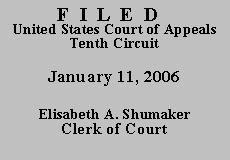

| UNITED STATES OF AMERICA,
v.
|
No. 04-6301
(D.C. No. CR-03-242-T) |
BACKGROUND
As a result of a substantial federal and state investigation into the trafficking of cocaine base in southwest Oklahoma, Smith was indicted along with four other individuals for a variety of drug and firearm charges. Smith pleaded guilty to conspiracy to possess with intent to distribute 50 or more grams of cocaine base and 500 or more grams of cocaine. Smith's presentence report recommended a base offense level of 38 based on drug quantity, a two-level enhancement for possession of a dangerous weapon, and a three-level reduction for acceptance of responsibility. This total offense level of 37, coupled with a criminal history category of IV, resulted in a recommended sentence range of 292 to 365 months.
Before sentencing, Smith filed an objection to the calculation of his base offense level. Specifically, he argued that, pursuant to the Supreme Court's decision in Blakely v. Washington, 542 U.S. 296 (2004), he could not be sentenced based on a higher drug quantity than the amount to which he pleaded guilty, because any facts used to enhance a sentence must be admitted by the defendant or found by a jury beyond a reasonable doubt.
Smith renewed his Blakely objection at his sentencing hearing. The court responded by ruling that it would impose a sentence under the Sentencing Guidelines, as the issue of the Guidelines' constitutionality was at that time pending before the Supreme Court, but that it would also impose an alternative sentence in the event that the Guidelines were invalidated. The court then announced a Guidelines sentence of 292 months and, in the event that the Guidelines were ruled unconstitutional, an alternative sentence of 14 years (168 months).
DISCUSSION
In United States v. Booker, 543 U.S. 220, 125 S.Ct. 738 (2005), the Supreme Court held that "[a]ny fact (other than a prior conviction) which is necessary to support a sentence exceeding the maximum authorized by the facts established by a plea of guilty or a jury verdict must be admitted by the defendant or proved to a jury beyond a reasonable doubt." Id. at 756. "As a result, the Court held that mandatory application of the Guidelines violates the Sixth Amendment when judge-found facts, other than those of prior convictions, are employed to enhance a sentence." United States v. Gonzalez-Huerta, 403 F.3d 727, 731 (10th Cir.) (en banc), cert. denied, 126 S. Ct. 495 (2005).
Smith's objection based on Blakely was sufficient to preserve his Booker argument on appeal, see United States v. Geames, 427 F.3d 1333, 1339 (10th Cir. 2005), and thus we review for harmless error, see United States v. Riccardi, 405 F.3d 852, 874-75 (10th Cir.), cert. denied, 126 S. Ct. 299 (2005). Booker error is harmless when the government shows that the error "did not affect the district court's selection of the sentence imposed." Id. at 875 (quotations omitted).
The government concedes, and we agree, that the district court committed constitutional Booker error. The government also admits that it cannot show that the error did not affect the sentence imposed in light of the fact that the district court announced an alternative sentence lower than the Guideline sentence actually imposed. We agree that the error was not harmless.
We therefore REMAND this action to the district court with instructions to vacate Smith's sentence and to resentence him in accordance with Booker.
ENTERED FOR THE COURT
David M. Ebel
Circuit Judge
*.After examining appellant's brief and the appellate record, this panel has determined unanimously that oral argument would not materially assist the determination of this appeal. See Fed. R. App. P. 34(a)(2) and 10th Cir. R. 34.1(G). The case is therefore ordered submitted without oral argument. This Order and Judgment is not binding precedent, except under the doctrines of law of the case, res judicata, and collateral estoppel. The court generally disfavors the citation of orders and judgments; nevertheless, an order and judgment may be cited under the terms and conditions of 10th Cir. R. 36.3.